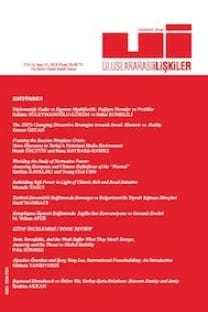Küreselleşme, Uluslararası İlişkiler ve Hegemonya
Westphalia, Küreselleşme, 11 Eylül, Hegemonya, Ulus-Devlet.
Globalization, International Relations and Hegemony
Westphalia, Globalization, September 11, Hegemony, Nation-State.,
- ISSN: 1304-7310
- Başlangıç: 2004
- Yayıncı: Uluslararası İlişkiler Konseyi Derneği İktisadi İşletmesi
Küreselleşen Kültür ve Değişen Yerleşik Siyasal Konumlar
Dünya Ekonomisi Küreselleşmenin Neresinde?
Küreselleşme, Avrupa Birliği ve Türkiye Üçgeninde Kimlik Parçalanması ve Kimlik Yönetişimi
Küreselleşme ve Bilgi Toplumu: Eğitimin Küreselleşmesi ve Neo-Liberal Politikaların Etkileri
Mehmet DİKKAYA, Deniz ÖZYAKIŞIR
Küreselleşme, Uluslararası İlişkiler ve Hegemonya
Uluslararası İlişkilerde Küreselleşme Olgusu ve Ulus-Devlet Kavramını Yeniden Düşünmek
